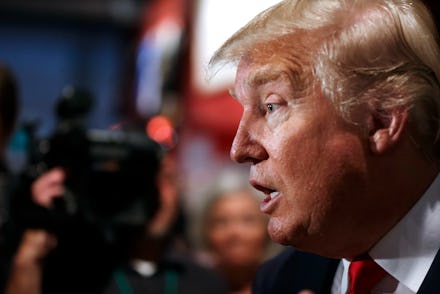The Best Part of the RNC Loyalty Pledge Is That Everyone Has to Endorse Trump if He Wins

The leadership of the Republican Party has tried everything from polite phone calls to short-lived truces in a bid to reign in the antics of current presidential frontrunner Donald Trump. But as requests to "tone it down" on rhetoric about immigrants, women and his primary opponents continue to fall on deaf ears, party leaders are now delivering an ultimatum that even Trump can't ignore: swear an oath of allegiance, or else.
On Wednesday, Politico reported that the Republican National Committee had circulated a "loyalty oath" to every GOP candidate, asking them to pledge not to run as an independent or third-party candidate should they lose the nomination. The oath also requires that each candidate endorse whomever the eventual nominee is. Here it is in full:
"I [name] affirm that if I do not win the 2016 Republican nomination for president of the United States I will endorse the 2016 Republican presidential nominee regardless of who it is. I further pledge that I will not seek to run as an independent or write-in candidate nor will I seek or accept the nomination for president of any other party."
Insiders began leaking Trump's intention to agree to the loyalty oath almost immediately. At press conference on Thursday at Trump Tower in New York, he confirmed that he had signed the oath, pledging his loyalty to the GOP.
"The best way for the Republicans to win is if I win the nomination and go directly against whoever they happen to put up," he said. "For that reason, I have signed the pledge."
But in what could possibly turn into one of the most entertaining unintended consequences of the campaign, the other candidates who signed the oath — most of whom have been on the receiving end of Trump's insults for weeks — also promised to endorse Trump for the nomination in the event that he emerges victorious.
The pledge was aimed squarely at Trump. The oath was the RNC's most direct response to what more and more establishment Republicans see as an existential threat to their White House ambitions — the possibility that the anti-establishment tycoon could lead a self-financed third-party bid for the presidency.
The announcement took place shortly after a personal meeting with RNC chairman Reince Priebus, whose kid-glove approach to Trump has seen mixed results since the billionaire declared his candidacy in June.
With his high poll numbers, vast personal fortune and the support of a vocal strain of anti-establishment conservatives, Trump could conceivably pull enough voters from the eventual Republican nominee to spoil the election in favor of the Democrats. It was a nightmare scenario for the GOP that, so far, the party has been unable to wake up from.
Not that the party and its supporters haven't tried. In the first question of the party's first primary presidential debate in August, Fox News chief political anchor Bret Baier asked any candidate unwilling to pledge their support to the party's eventual nominee to raise their hands. This is what happened:
Why he signed: Part of Trump's motivation to finally acquiesce to the will of the party leadership is likely based in pragmatism. Last week, the South Carolina Republican Party announced that any candidates who wish to appear on the ballot for the state's crucial primary must sign a pledge of party loyalty, stating that they "generally believe in and intend to support the nominees and platform of the Republican Party in the Nov. 8, 2016, general election," by Sept. 30. Party leaders in Virginia and North Carolina have discussed the implementation of similar requirements, all of which would bar Trump from appearing on primary ballots unless he pledged his fidelity to the Republican Party.
But the plan has a few crucial flaws. First, it's not immediately clear exactly how actionable a violation of the oath would be. The pledge, after all, isn't a binding legal contract. It's a piece of political theater, which can be dismissed or revoked or ignored at any time. If Trump fails to win the nomination and decides to continue with his run, (which is not unimaginable — the pledge is easily dismissed with a solemn declaration that "the fate of the United States is too important to leave to Jeb Bush"), there's little recourse that Priebus or the Republican establishment could take against him.
The more amusing possibility, however, is the Bizarro World option: that Trump may defy the odds, win the nomination and demand fealty from his 16 fallen foes. By signing the pledge of allegiance, Bush and each of the other 15 presidential hopefuls in the Republican field are explicitly promising to "endorse the 2016 Republican presidential nominee regardless of who it is" — even if it's Trump. Although he remains susceptible to the near-inevitable crumbling of support that bygone insurgent candidates have suffered, there remains the amusing possibility that late next spring, more than a dozen senators, governors and captains of industry will have to bend the knee to the man who turned them into losers.
Jeb Bush might at least want to sign the pledge in pencil.